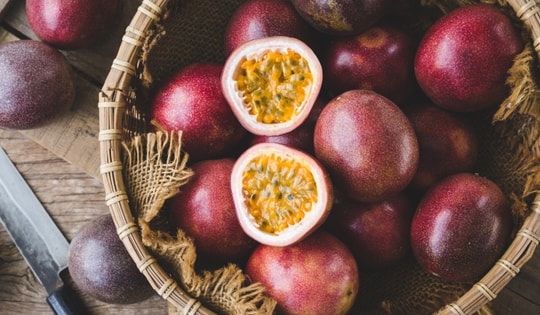Struggling with Pich Nieng
(Baonghean) - It can be said that, with a planned area of hundreds of hectares, passion fruit trees have contributed to changing the face of the border commune of Tri Le in particular and the mountainous district of Que Phong in general. Many ethnic minority households on this land have escaped poverty thanks to passion fruit trees, have more jobs to increase their income. And this crop has also been changing the Kho Mu ethnic community in Pich Nieng village.
Carrying the concerns of Mr. Lu Son - Chief Prosecutor of Que Phong District People's Procuracy when mentioning the story of 2 people from Pich Nieng village, Tri Le commune, Que Phong district cutting down more than 1,200 passion fruit trees of Nafoods Joint Stock Company, we crossed National Highway 16 to Pich Nieng village.
Without passion fruit trees, very few people would know about the existence of a Khmu ethnic minority village on the Tri Le border land. Previously, people lived a few kilometers away from their new home. Pich Nieng village moved to the resettlement area at the same time as the Mong villages in Tri Le, and were arranged to settle along National Highway 16, in areas called D1, D2, D3 of the Minh Chau resettlement area, of which Pich Nieng belonged to area D3.
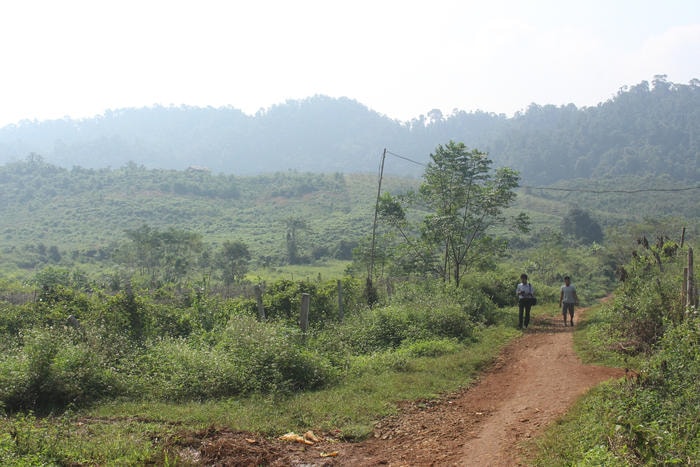 |
| The 4.5-hectare communal land area for growing passion fruit was borrowed by Nafoods Joint Stock Company from Pich Nien villagers. Photo: Dao Tuan |
We stopped at a house at the end of the concrete road. This is also the last area of the village, if we continue, we will reach the passion fruit growing area of Nafoods Joint Stock Company. Talking to a woman in her early 50s who was wrapping a baby about 8-10 months old on her back, she said she was looking after her grandchild. While looking after her grandchild, she used her feet to lift a batch of rice drying on a canvas as big as 2 trays. Her Mandarin was a bit broken, but she was bolder: "This season's harvest is only that much. It's okay." Then she showed us the way to the passion fruit growing area. Before we left, she said something that no one could understand, I only vaguely heard 2 names: Moong Van Nghe and Moong Van Xanh.
Surely that skinny woman wanted to remind us about the two citizens of Pich Nieng who were also the two defendants in the case of cutting down 1,223 passion fruit trees of Nafoods Joint Stock Company in early August 2017. But that is a story to tell later, for now we were present at the passion fruit area with an area of about 4.5 hectares planted by Nafoods Company in the past time.
It can be said that, with a planned area of hundreds of hectares, passion fruit trees have contributed to changing the face of the border commune of Tri Le in particular and the mountainous district of Que Phong in general. Many ethnic minority households on this land have escaped poverty thanks to passion fruit trees, have more jobs to increase their income. And this crop has also changed the Khmu ethnic community in Pich Nieng village - but unfortunately in a different direction.
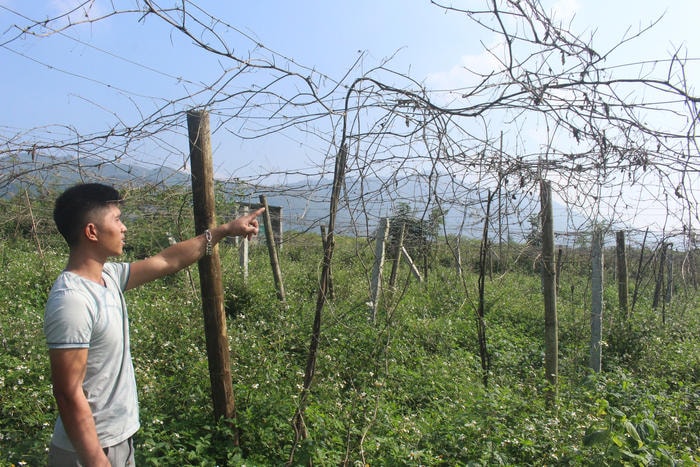 |
| Passion fruit trellis withered vines after being cut down by thieves. Photo: Nhat Lan |
Located in the center of the passion fruit growing area of Tri Le commune, but Pich Nieng village with 50 households and 254 people has only 2 households growing about 1,000m2 of passion fruit. The reason these 2 households "received" support from Nafoods Company to grow passion fruit is because they "exchanged" their bamboo garden and meters for the enterprise to use as trellises and stakes on the passion fruit plots. The remaining 48 households have absolutely nothing to do with this new crop. It even brought Pich Nieng people a bitter resentment and a memorable lesson about behavior before the law.
When standing in front of the passion fruit garden that had been fined at the root, my colleague did not say a word. More than 1,200 passion fruit trees were chopped down by Moong Van Xanh (born in 1985) and Moong Van Nghe (born in 1994). Now they are just dry vines swaying in the early season wind. On August 10, 2017, the passion fruit trees were chopped down by Xanh and Nghe. On October 5, 2017, the Investigation Police Agency of Que Phong District Police issued a decision to prosecute the case, prosecute the accused and issue an arrest warrant for the crime of "Property destruction and theft". The village of Pich Nieng was shaken. No one expected that the vines were only as big as fingers, causing Moong Van Xanh and Moong Van Nghe to face many years in prison.
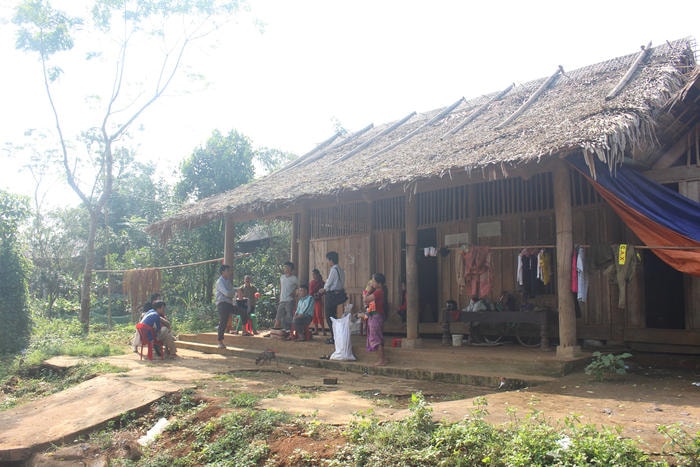 |
| The house of the Head of Pich Nieng Village Management Board, Luong Van Hung. Photo: Dao Tuan |
In the narrow space filled with the strong smell of early wine, Village Chief Luong Van Hung said that when he moved to the resettlement area, the village was allocated 5 hectares of communal land by the State. Normally, the whole village would produce this land together or give it to families after they separated and started new families. However, when Nafoods Joint Stock Company planted passion fruit in Tri Le Commune, Que Phong District, the enterprise borrowed 4.5 hectares from the people of Pich Nieng Village. Every day, passing by the communal land where the enterprise had built trellises and planted stakes to plant lemons, many people expressed their dissatisfaction. “We do not have enough land for production and cultivation while the communal land of the village is used to grow passion fruit for the enterprise. People are upset and do wrong things,” said Cut Van Dong, Village Captain of Pich Nieng.
The root of the problem is also due to the limited level of education and lack of understanding of the law. Therefore, now when looking back at the incident of cutting down passion fruit trees that led to the arrest of Moong Van Xanh and Moong Van Nghe, everyone is shocked as if they had just woken up from a long sleep. "Anh Xanh is "drunk" (wrong - PV), "drunk" very much. I just hope the law will give my family a way. Please let me go home and work as a worker for "Nay phut" (Nafoods - PV) to compensate them. A few years is fine" - Ms. Hung Thi Thu, Moong Van Xanh's wife, sobbed with tears. The woman is not yet 30 years old but has aged, her eyes are dark after many days of sleepless nights worrying about her husband and taking care of her mentally ill mother-in-law. She said that since the day Xanh was arrested, she has visited him twice, and each time the couple hugged and cried, not knowing what to do.
There was one thing that bothered us throughout our stay in Pich Nieng: why don't people here grow passion fruit, when in fact this crop is 10 times more effective than growing rice? Talking to the Chairman of Tri Le Commune People's Committee, Vi Van Cuong, he explained: "It's hard to say. It's true that there are many ways for Pich Nieng to escape poverty. People can grow passion fruit, eggplant, and taro - products that are easy to sell. The locality has also organized many campaigns to mobilize and propagate people to develop economic models, but people don't do it. The Kho Mu people are different from the Thai and Mong people."
Meanwhile, Mr. Pham Duy Thai - Director of Nafoods Joint Stock Company said that currently, households in Pich Nieng have garden and residential land of up to 2,000m2, if they only spend about 1,000m2 to grow passion fruit, the average income of each household can be up to 80-100 million VND; materials for piling and building a house frame are available, people only have to spend a small amount of money and invest time and effort, the company is willing to buy all the products for the people. "But they don't do it. They only plant a few cassava patches and a few sugarcane bushes," Mr. Thai shook his head and shared.
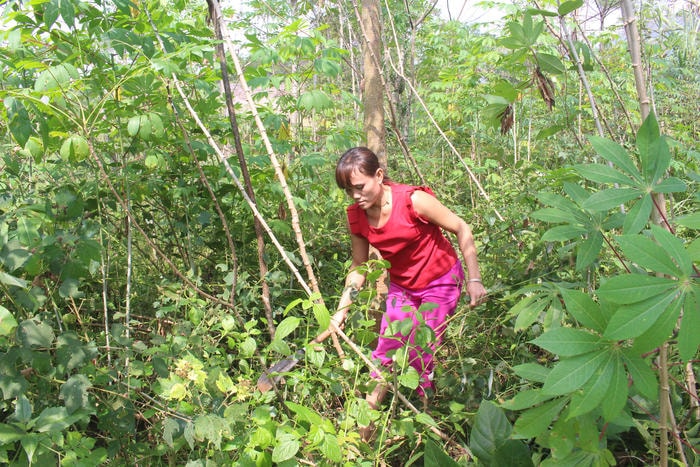 |
| Living in the passion fruit growing center of Tri Le commune, Pich Nieng people mainly grow cassava in their home gardens. Photo: Nhat Lan |
Of the 50 households in Pich Nieng, only 4 are not poor, of which 2 grow passion fruit. The remaining, equivalent to 80%, are poor households, and it seems that people do not want to escape. That is a reality. How to change Pich Nieng - that is a long story and if there is no concern from the village, the commune, the district, and even agencies, departments, and businesses, the Pich Nieng people will still live on a land rich in potential but will exclude themselves from the economic life of the community...
Returning to the thoughtful eyes of Mr. Lu Son - Chief Justice of Que Phong District People's Procuracy, when we informed him that Nafoods Joint Stock Company had sent a document requesting the authorities to consider reducing the sentence for Moong Van Xanh and Moong Van Nghe, the young Chief Justice breathed a sigh of relief. "Great. It is true that the law must be respected but it must be humane. We are all our people. Through this, I hope that people will understand and change."
We also remember and believe in the confidences of Village Chief Luong Van Hung, that after this story, the Khmu people in Pich Nieng will change their perception and thinking; will have a correct understanding of passion fruit trees, the role of enterprises and many households will consider passion fruit and taro as sustainable poverty-escape plants...
Nhat Lan - Dao Tuan

.jpg)

